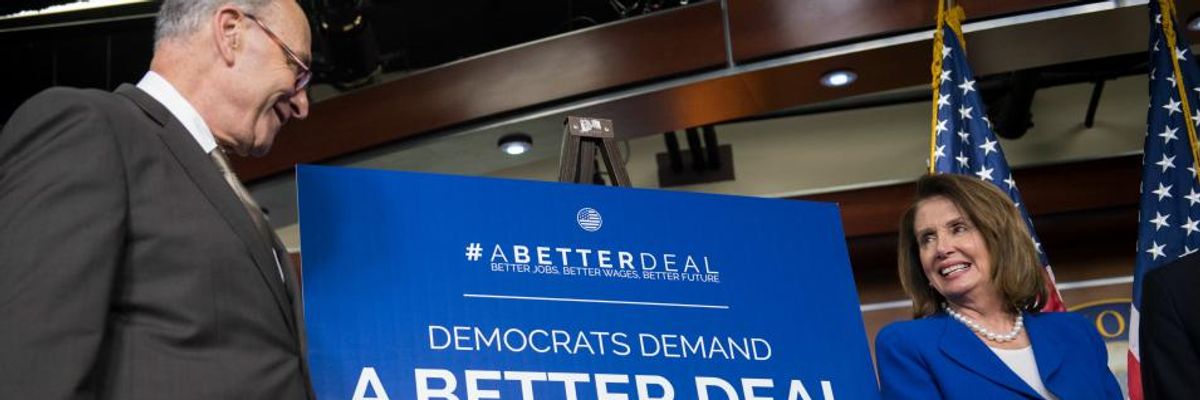House Speaker Nancy Pelosi on September 19 released the "Lower Drug Costs Now Act" (H.R. 3), which would institute a series of measures designed to address runaway prescription drug costs.
For people forced to struggle financially and medically as a result of the predatory behavior of Big Pharma, the legislation the speaker has offered starts a welcome conversation. For that conversation to end with the kind of bold transformations that patients must have in order to have affordable access to the medications they need, we believe there are some key perspectives that Congress should take into account.
The most important is that any solution to the drug pricing crisis should include a public option for pharmaceuticals. The speaker argues compellingly that drug prices that are multiple times the cost of production and sold in the U.S. for multiple times prices charged overseas are a sign of market failure. But another way to look at this is that it is the market doing what the market does best: maximize profits for a few at the expense of the many. Markets aren't designed to prioritize the public good over corporate greed; that is why we need a public alternative that is solely dedicated to the public's health priorities.
Here are some additional observations that we think should drive the legislative conversation:
- While it authorizes the Department of Health and Human Services (HHS) to negotiate on up to 250 brand-name drugs, H.R. 3 states that the HHS can't be expected to negotiate more than 25 drugs a year, which means that millions of Americans will be allowed to continue to suffer and die before negotiations even start on dozens of other medications that are essential to their health. Meanwhile, new drugs will come to market and be added to the queue for negotiation so that someday we, in the richest country in the history of the world, might somehow be able to afford our medication. We can, and must, do better
- It is smart for H.R. 3 to include a set of punitive measures as leverage at the negotiating table. But while the bill proposes fines and rebates against companies that refuse to negotiate in good faith or raise prices ex-post facto, the reality is these are back-end fixes. This does little good for patients having trouble paying for their prescriptions on the front end and who may suffer or die by the time a company is finally forced to pay fines and rebates. We can't wait for relief to maybe come in a few years, and certainly not diluted as it trickles down through a legal process into programs like Medicare
- The bill designates the Secretary of HHS to negotiate with industry on drug prices. Right now that would mean entrusting Alex Azar--former president of Eli Lilly, a company that controls around one-third of the global insulin market--to negotiate the best price on insulin for patients. Furthermore, in the case of a drug like insulin--developed in a public lab almost a century ago by scientists who sold their US patents for $1 each in hopes of maintaining affordability in perpetuity--the best price would be free, with the next-best price below cost. Negotiation is not the best we can do--especially in the context of the revolving door between government and Big Pharma
- H.R. 3 sets parameters for negotiation only for drugs that have no market competition, while the FDA's own studies have shown that we only get competitive prices when a drug has multiple competitors on the market
- Public research and development capacity, as well as manufacturing capacity, would give us much more leverage at the negotiating table. What's happening in the United Kingdom right now is a cautionary tale: Its National Health Service has been negotiating the price of a new cystic fibrosis drug, Orkambi, for more than three and a half years since the drug has been approved for market. But the company won't budge, and it's the sole producer of this medication. In the meantime, there have been more than 255 recorded deaths of patients who could have benefitted from the drug. With public R&D and production, we'd have real leverage and a far stronger position at the negotiating table. If the industry doesn't want to concede prices that work for the whole of America, we can make the drugs ourselves
here has never been more momentum or more public outrage on drug pricing and issues of corporate excess in the pharmaceutical sector. We have a real opportunity to do something transformative that can help ensure the health and wellbeing of Americans for decades to come. Do we really want to say that the "best we can do" as a country is to lower the inflated prices set by Big Pharma on some drugs so that we continue to pay more than the average that other high-income countries pay?
The public is demanding better, and a public option in pharmaceuticals is critical to delivering what they need for their healthcare.

